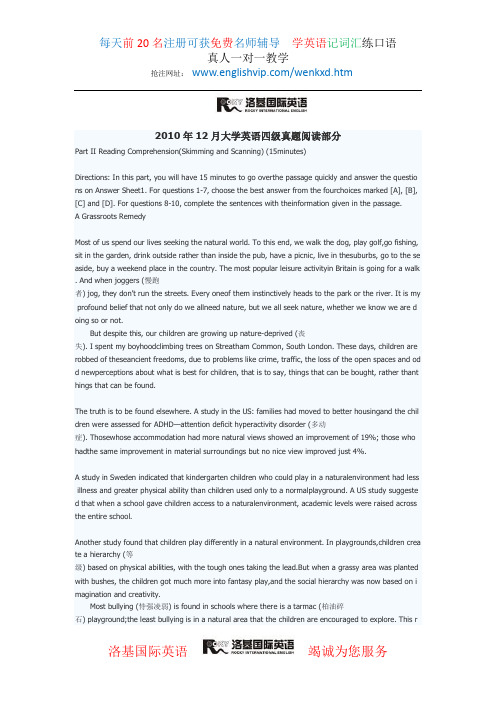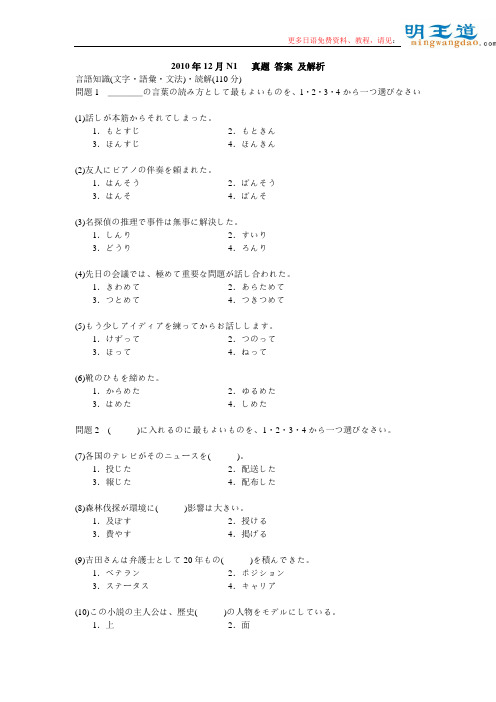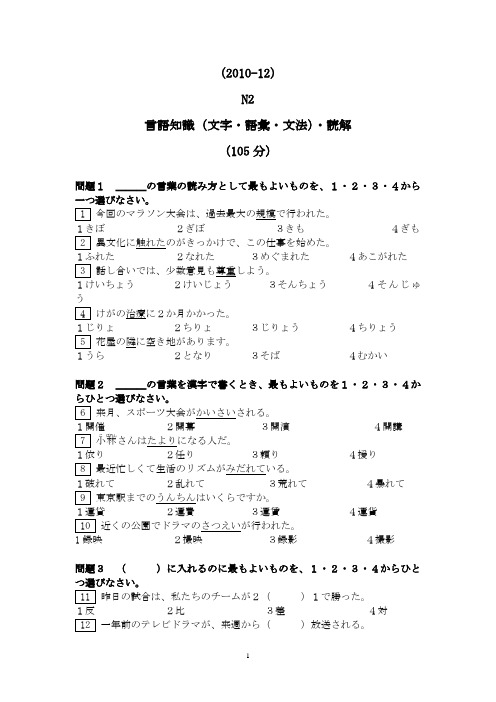2010年12月N2读解(综合理解篇:问题12)真题和解析
2010年12月日语能力考N2读解(中篇:问题11)真题答案和解析

新世界日语名师解析N2读解(中篇:问题11)作者:石文青老师问题11综述:中篇文章往往对一些细节进行是否理解的考察。
主要包括具体指代的内容是什么;作者认为的原因是什么;作者是如何考虑的之类的问题。
此次N2能力考的三篇中篇文章,也还是延续了历年中篇文章的主要考核模式。
在中篇文章的阅读理解中,往往未必直接能在文章中找到一模一样的答案,但是只要在问题的前后还是可以通过举例、反论、引用、排除等得出结论。
也就是说,答案还是经常出现在问题的附近。
此次中篇阅读中,相对比较难的是第61题。
如果没有找准文章理由根据而是按照一般理解的话,非常容易误选4。
第63题。
完全要通过作者所举的例子归纳。
这题很容易会被理解为选项2。
第 65题。
如果按照自己的理解,很容易误选3。
因此,在做此类阅读时,最重要的归纳、理解,找准说明的所在之处。
并且,千万不可主观地按照自己或者一般的想法。
因为问题是作者想说什么,作者是怎么说的。
(1)60問选1问:時間がどんどん加速されている(时间不断地被加速),指的是什么?1 因为必须要做的事情很多,所以感到时间短暂。
2 只要热衷于什么事,就会感到一天的时间短暂。
3 因为工作效率的提高,一天的工作时间变短。
4 由于技术的进步,花费在工作的时间变短。
解析:文中的第四行「時間の間隔が短くなったような気分で追い立てられているためでしょう(时间的间隔好像变短了的感觉)」。
这句话明确地道出了“觉得时间短暂”,所以首先可排除3、4选项所说的“时间变短”。
文中紧接着问题的这句话之后,就讲到「何事にも「早く、早く」とせかされ、時間と競争するかのように忙しさに追われていることを(任何事情都被“赶快,赶快”地催促,好像和时间竞争一样被繁忙追赶着)」。
选项2的“热衷于”在此都没有提到。
所以正确选项为1。
61問选2问:いつも何かしていないと気が落ち着かない(总是只要没有在做什么事情就会感到不平静)的原因,作者是如何考虑的?1 只要什么都不做,就会感到心灵空虚。
2010年12月日语能力考试N2解析

2010年12月日语能力考试二级N2真题解析文字词汇問題1综述:这是考查读音的一道题。
平时要注音单词的音读和训读。
而这次还有一个特点就是五道题当中,1,3,4共三道题考查了多个读音的单词,但并不生僻,所以平时要注意区别和积累,也不会很难。
1問答案:1 解析:規模(きぼ)解题要点:这道题考查的是名词的音读。
「規」的常用读音就一个「き」。
「模」常用音读音有两个「ぼ」和「も」。
多用音位「も」「模(も)型(けい)」「模(も)範(はん)」「模(も)索(さく)」「模(も)擬(ぎ)」,而读「ぼ」的读音主要就是規模「規(き)模(ぼ)」。
2問答案:1 解析:触れた(ふれた) 解题要点:此题考查的是动词的训读音。
选项中出现了四个词尾类似的动词,分别为「触(ふ)れる」「慣(な)れる」「恵(めぐ)まれる」「憧(あこが)れる」。
四个动词的特点是都与助词「に」搭配使用。
触れる:接触,触摸;触动,大动;涉及,提到。
「異文化に触れる」:接触不同的文化。
慣れる:习惯;熟练。
「留学生活に慣れる」:习惯留学生活。
「新しい仕事に慣れる」:适应新的工作。
恵まれる:赋予,富有。
「音楽の才能に恵まれている」:富有音乐天赋。
憧れる:憧憬,向往。
「スターに憧れる」:憧憬当明星。
3問答案:3 解析:尊重(そんちょう)解题要点:此题考查的是单词的音读音。
注意长短音。
「尊」的音读音为「そん」,「重」的音读音为「ちょう」「じゅう」。
「重(じゅう)大(だい)」「重(じゅう)要(よう)」「慎(しん)重(ちょう)」「尊(そん)重(ちょう)」。
4問答案:4 解析:治療(ちりょう)解题要点:此题考查的是单词的音读音。
注意在长短音。
「治」音读音为「じ」「ち」, 「政(せい)治(じ)」「治(ち)療(りょう)」。
多见的还有训读音「治(なお)す」「治(なお)る」。
5問答案:2 解析:隣(となり)解题要点:此题考查的是单词的训读音。
选项1是:裏(うら) 选项3是:側(そば) 选项4是:向(む)かい。
2010年12月日语N2听力真题

(2010-12)N2聴解(50分)問題1問題1では、まず質問を聞いてください。
それから話を聞いて、問題用紙の1から4の中から、最もよいものを一つ選んでください。
1番1インターネットで調べる2男の学生から本を借りる3図書館へ本を借りに行く4じゅぎょうのノートを見る2番1サンプルをとどける2工場に電話する3しりょうを直す4飛行機を予約する3番1今いる映画館の前で待つ2もう一つの映画館で待つ3本屋で待つ4きっさてんで待つ4番1いっしょに散歩に行く2車いすを押す練習をする3食事の手伝いをする4仕事の記録を書く5番1取り消しの人をさくじょする2参加者を追加する3メールアドレスをさくじょする4名前をならべ替える問題2問題2では、まず質問を聞いてください。
そのあと、問題用紙のせんたくしを読んでください。
読む時間があります。
それから話を聞いて、問題用紙の1から4の中から、最もよいものを一つ選んでください。
1番1商品の値段を下げる2商品のデザインを変える3商品の味を調整する4商品の名前を変える2番1おくさんが好きなケーキを買っていく2子どもが気に入りそうなものを買っていく3部長がよろこびそうなものを買っていく4何も持って行かない3番1会議にちこくしたこと2お客様にれんらくしなかったこと3会議のしりょうを作らなかったこと4メモを見逃したこと4番1すぐに必要な本や食器など2すぐに必要な衣類など3しばらく必要のない本や食器など4しばらく必要のない衣類など5番1しりょうが全然できていないから2しりょうのしめきりが明日だから3残ってしりょうを作るように言われたから4休みの前にしりょうを完成させたいから6番1無料でしゅうりしてもらう21万円でしゅうりしてもらう33千円で調べてもらう4しゅうりしないで送り返してもらう問題3問題3では、問題用紙に何も印刷されていません。
この問題は、全体としてどんな内容かを聞く問題です。
話の前に質問はありません。
2010年12月真题听力答案

Part III Listening Comprehension
Conversation 2
Questions 22 to 25 are based on the conversation you have just heard. 22. What does the woman say about British railways? B 23. What do some people who write to the man complain about? D 24. What does the man say threatens the existence of railways? B 25. What does the man say about railways in other countries? D
Part III Listening Comprehension
Conversation 1
Questions 19 to 21 are based on the conversation you have just heard. 19. What is the key to write a good classical detective story according to the man? D 20. What does the man mainly need when working on a book? D 21. What does the man say about writers? C
Part III Listening Comprehension
Conversation 1
W: When you write a novel, do you know where you‟re going, Dr. James? M: Yes, you must, really, if you‟re writing the classical detective story, because it must be so carefully plotted and so carefully clued. I have schemes. I have charts. I have diagrams. It doesn‟t mean to say I always get it right, but I do plan before I begin writing. But what is so fascinating is how a book changes during the process of writing. It seems to me that creative writing is a process of revelation, really, rather than of creativity in the ordinary sense. W: When you‟re planning the basic structure, do you like to go away to be sure that you‟re by yourself? M: I need to be by myself certainly, absolutely. I can‟t even bare anybody else in the house. I don‟t mind much where I am as long as I‟ve got enough space to write, but I need to be completely alone.
2010年12月四级真题阅读部分(附答案详解)

2010年12月大学英语四级真题阅读部分Part II Reading Comprehension(Skimming and Scanning) (15minutes)Directions: In this part, you will have 15 minutes to go overthe passage quickly and answer the questio ns on Answer Sheet1. For questions 1-7, choose the best answer from the fourchoices marked [A], [B], [C] and [D]. For questions 8-10, complete the sentences with theinformation given in the passage.A Grassroots RemedyMost of us spend our lives seeking the natural world. To this end, we walk the dog, play golf,go fishing, sit in the garden, drink outside rather than inside the pub, have a picnic, live in thesuburbs, go to the se aside, buy a weekend place in the country. The most popular leisure activityin Britain is going for a walk . And when joggers (慢跑者) jog, they don’t run the streets. Every oneof them instinctively heads to the park or the river. It is my profound belief that not only do we allneed nature, but we all seek nature, whether we know we are d oing so or not.But despite this, our children are growing up nature-deprived (丧失). I spent my boyhoodclimbing trees on Streatham Common, South London. These days, children are robbed of theseancient freedoms, due to problems like crime, traffic, the loss of the open spaces and od d newperceptions about what is best for children, that is to say, things that can be bought, rather thant hings that can be found.The truth is to be found elsewhere. A study in the US: families had moved to better housingand the chil dren were assessed for ADHD—attention deficit hyperactivity disorder (多动症). Thosewhose accommodation had more natural views showed an improvement of 19%; those who hadthe same improvement in material surroundings but no nice view improved just 4%.A study in Sweden indicated that kindergarten children who could play in a naturalenvironment had less illness and greater physical ability than children used only to a normalplayground. A US study suggeste d that when a school gave children access to a naturalenvironment, academic levels were raised across the entire school.Another study found that children play differently in a natural environment. In playgrounds,children crea te a hierarchy (等级) based on physical abilities, with the tough ones taking the lead.But when a grassy area was planted with bushes, the children got much more into fantasy play,and the social hierarchy was now based on i magination and creativity.Most bullying (恃强凌弱) is found in schools where there is a tarmac (柏油碎石) playground;the least bullying is in a natural area that the children are encouraged to explore. This reminds meunpleasantly of Sunnyhill School in Streatham, with its harsh tarmac, where I used to hang a boutin corners fantasising about wildlife.But children are frequently discouraged from involvement with natural spaces, for health andsafety reas ons, for fear that they might get dirty or that they might cause damage. So, instead,the damage is done to the children themselves: not to their bodies but to their souls.One of the great problems of modern childhood is ADHD, now increasingly and expensivelytreated with drugs. Yet one study after another indicates that contact with nature gives hugebenefits to ADHD childr en. However, we spend money on drugs rather than on green places.The life of old people is measurably better when they have access to nature. The increasingemphasis fo r the growing population of old people is in quality rather than quantity of years. Andstudy after study fi nds that a garden is the single most important thing in finding that quality.In wider and more difficult areas of life, there is evidence to indicate that natural surroundingsimprove a ll kinds of things. Even problems with crime and aggressive behaviour are reduced whenthere is contact with the natural world.Dr William Bird, researcher from the Royal Society for the Protection of Birds, states in hisstudy, “A natural environment can reduce violent behaviour because its restorative process helpsreduce anger and impulsive behaviour.” Wild places need encouraging for this reason, no matterhow small their contri bution.We tend to look on nature conservation as some kind of favour that human beings aregranting to the n atural world. The error here is far too deep: not only do humans need nature forthemselves, but the ver y idea that humanity and the natural world are separable things isprofoundly damaging.Human beings are a species of mammals (哺乳动物). For seven million years they lived on theplanet as part of nature. Our ancestral selves miss the natu ral world and long for contact with non-human life. Anyone who has patted a dog, stroked a cat, sat un der a tree with a pint of beer, givenor received a bunch of flowers or chosen to walk through the park o n a nice day, understandsthat.We need the wild world. It is essential to our well-being, our health, our happiness. Without thewild wor ld we are not more but less civilised. Without other living things around us we are less thanhuman.Five ways to find harmony with the natural worldWalk: Break the rhythm of permanently being under a roof. Get off a stop earlier, make acircuit of the p ark at lunchtime, walk the child to and from school, get a dog, feel yourself movingin moving air, look, li sten, absorb.Sit: Take a moment, every now and then, to be still in an open space. In the garden,anywhere that’s not in the office, anywhere out of the house, away from the routine. Sit under atree, look at water, feel ref reshed, ever so slightly renewed.Drink: The best way to enjoy the natural world is by yourself; the second best way is incompany. Take a drink outside with a good person, a good gathering: talk with the sun and thewind with birdsong for b ackground.Learn: Expand your boundaries. Learn five species of bird, five butterflies, five trees, five birdsongs. Tha t way, you see and hear more: and your mind responds gratefully to the greateramount of wildness in y our life.Travel: The places you always wanted to visit: by the seaside, in the country, in the hills. Takea weeken d break, a day-trip, get out there and do it: for the scenery, for the way through thewoods, for the birds , for the bees. Go somewhere special and bring specialness home. It lastsforever, after all.注意:此部分试题请在答题卡1上作答。
2010年12月N1阅读解析

2010年12月日语能力考试N1阅读部分解析----阅读部分解析----問題846正解:1解析:本文讲述了在当今这个时代,创造力对于取得成功来说是至关重要的。
而由于创造力所要求的是产出新事物的能力,因此要培养这种能力,必须要经历失败。
解题关键在于文章的最后一段“现如今要培养创造力,至关重要的并不是解决既定课题的能力,而是自己设定课题的能力”。
结合上文也就是说要从失败当中找出需要解决的课题,最终逐步完善创造出新的东西。
因此选1。
现如今培养创造力,需要的是在不断经历失败的同时,找出待解决课题的能力。
47正解:2解析:本文是一封书信。
正文开头讲到“先日お知らせいたしました通り”,可以知道,后面的“由于公司经营规模扩大,公司将于明年1月份从现在的朝日大厦搬迁到山中大厦”并不是新信息,而是已经通知过对方的信息了。
而本书信所要传递的信息是接下来的部分。
“在整个公司搬迁之前,原先一直位于东川区的国际科将先进行搬迁。
定于12月3日搬迁至山中大厦的五楼”。
然后信中给出国际科最新的联系方式。
这道题目要搞清楚公司和国际科的地址变动是两个不同的时间,公司搬迁是明年一月,而国际科搬迁是今年的十二月。
本文目的明确,是要告知收信人国际科的最新联系方式,因此这道题应当选择选项2国际科于12月搬至山中大厦。
48题3解析:本文所要表达的观点是,一直以来被人们认为是恒久不变的价值观和科学常识,在表面上看起来虽然似乎是静止不动的,但事实上这些都在随着时代的脚步不断地发生着缓慢的变化。
而由于人们往往认为自己在成长期所接收到的常识和价值观才是恒久不变正确的,这样,不同代的人,他们的常识和价值观就会出现些许的差异。
明白了作者所要表达的意思就能够选出正确的答案,选项3。
虽然不同代的人会有不同的感觉,但在个人心中,都是恒久不变的。
49题2本文所要表达的观点是:给出的数据都具有两面性,单单只看一面的话,虽然结果看起来相对清晰明了,但存在一种危险性:容易让对立轴显得更加突出,由此而引发不必要的混乱。
2010年12月日语N1真题 答案及解析 完整版

2010年12月N1 真题答案及解析言語知識(文字・語彙・文法)・読解(110分)問題1____の言葉の読み方として最もよいものを、1・2・3・4から一つ選びなさい(1)話しが本筋からそれてしまった。
1.もとすじ2.もときん3.ほんすじ4.ほんきん(2)友人にピアノの伴奏を頼まれた。
1.はんそう2.ばんそう3.はんそ4.ばんそ(3)名探偵の推理で事件は無事に解決した。
1.しんり2.すいり3.どうり4.ろんり(4)先日の会議では、極めて重要な問題が話し合われた。
1.きわめて2.あらためて3.つとめて4.つきつめて(5)もう少しアイディアを練ってからお話しします。
1.けずって2.つのって3.ほって4.ねって(6)靴のひもを締めた。
1.からめた2.ゆるめた3.はめた4.しめた問題2()に入れるのに最もよいものを、1・2・3・4から一つ選びなさい。
(7)各国のテレビがそのニュースを()。
1.投じた2.配送した3.報じた4.配布した(8)森林伐採が環境に()影響は大きい。
1.及ぼす2.授ける3.費やす4.掲げる(9)吉田さんは弁護士として20年もの()を積んできた。
1.ベテラン2.ポジション3.ステータス4.キャリア(10)この小説の主人公は、歴史()の人物をモデルにしている。
1.上2.面3.側4.内(11)交渉が()進み、無事に契約することができた。
1.しとやかに2.しなやかに3.円滑に4.性急に(12)次の大会に向けて、チームの()を強めよう。
1.収束2.結束3.親密4.緊密(13)その企業は巨大な資本を()に、海外の市場に進出した。
1.背景2.根源3.後援4.発端問題3____の言葉に意味が最も近いものを、1・2・3・4から一つ選びなさい。
(14)今回の研修会は、出席者がまばらだった。
1.多かった2.少なかった3.まじめだった4.ふまじめだった(15)昨日は一日中どんよりした天気だった。
1.曇っていて暗かった2.晴れていて明るかった3.風が吹いて涼しかった4.雨が降って蒸し暑かった(16)父は毎朝、丹念に新聞に目を通す。
2010年12月日语N2真题加答案

(2010-12)N2言語知識(文字・語彙・文法)・読解(105分)問題1 ___の言葉の読み方として最もよいものを、1・2・3・4から一つ選びなさい。
1 今回のマラソン大会は、過去最大の規模で行われた。
1きぼ 2ぎぼ 3きも 4ぎも 2 異文化に触れたのがきっかけで、この仕事を始めた。
1ふれた 2なれた 3めぐまれた 4あこがれた 3 話し吅いでは、尐数意見も尊重しよう。
1けいちょう 2けいじょう 3そんちょう 4そんじゅう 4 けがの治療に2か月かかった。
1じりょ 2ちりょ 3じりょう 4ちりょう 5 花屋の隣に空き地があります。
1うら 2となり 3そば 4むかい問題2 ___の言葉を漢字で書くとき、最もよいものを1・2・3・4からひとつ選びなさい。
6 来月、スポーツ大会がかいさいされる。
1開催 2開幕 3開演 4開講 7 小こ林ばやしさんはたよりになる人だ。
1依り 2仸り 3頼り 4援り8 最近忙しくて生活のリズムがみだれている。
1破れて 2乱れて 3荒れて 4暴れて9 東京駅までのうんちんはいくらですか。
1運貸 2運費 3運賃 4運貨10 近くの公園でドラマのさつえいが行われた。
1録映 2撮映 3録影 4撮影問題3 ( )に入れるのに最もよいものを、1・2・3・4からひとつ選びなさい。
11 昨日の試吅は、私たちのチームが2( )1で勝った。
1反 2比 3差 4対12 一年前のテレビドラマが、来週から( )放送される。
1改 2再 3更 4復13 このレストランは予約( )です。
1則 2法 3制 4系 14 この大学は就職( )が高い。
1率 2割 3度 4倍15 今は( )制度からの移行時期だ。
1先 2旧 3昔 4元問題4 ( )に入れるのに最もよいものを、1・2・3・4からひとつ選びなさい。
16 あの町の人口は( )減尐している。
1軽かる々がると 2順じゅん々じゅんに 3徐じょ々じょに 4細ほそ々ぼそと 17 最近、物価が( )している。
- 1、下载文档前请自行甄别文档内容的完整性,平台不提供额外的编辑、内容补充、找答案等附加服务。
- 2、"仅部分预览"的文档,不可在线预览部分如存在完整性等问题,可反馈申请退款(可完整预览的文档不适用该条件!)。
- 3、如文档侵犯您的权益,请联系客服反馈,我们会尽快为您处理(人工客服工作时间:9:00-18:30)。
新世界日语名师解析N2读解(综合理解篇:问题12)
作者:邓俊玲老师
读解综合理解篇详解
问题12
综述:
综合理解是新题型,一般是考查共同提到的细节和对同一问题的不同观点。
要注意表示各自观点的词汇。
这道题有一定的难度,因为不仅要注意文章的表述还要注意文章所反映的观点。
不仅要了解每一篇文章,还要注重它们之间的共通点和各自的重点。
看文章时,带着这样的想法去做,就能提高做题速度和正确率了。
69問
选1
问:A和B都说了的是什么?
1 要重视职场的人际关系要怎么办才好?
2 要在职场让自己的努力获得承认要怎么办才好?
3工作后在职场失去自信的时候怎么办才好?
4 工作后自己的想法和周围人不一样的时候,怎么办才好?
解析:
文章A出现了「社会人になったばかりの今、皆さんは仕事の厳しさや学生時代にはなかったような人間関係の複雑さに驚いているのではないでしょうか」。
文章B出现了「その結果、今まで築いてきた人間関係まで壊してしまうことさえある」。
都是在讲人际关系,所以答案选1。
70問
选3
问:A和B给刚参加工作的人什么样的建议?
1 A认为要重视自己的价值观,B认为要回顾自己努力过来的样子。
2 A认为把自己的想法传达给对方很重要,B认为得到对方的承认很重要。
3 A认为尊重对方的想法很重要,B认为承认自己的努力很重要。
4 A 认为承认对方的意见很重要,B认为听周围人的话很重要。
解析:
文章A出「そんな時にはまず相手の考え方を受け入れてみてください。
その後で自分の考え方を述べればよいのです。
それまでは自分を抑えることも大切です」,也就是说要先听对方的话,而B出现「まず自分のこれまでの努力を肯定的にとらえてみよう」,也就是要首先肯定自己的努力,因此选项4是正确答案。
